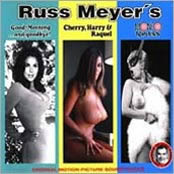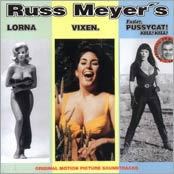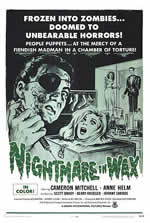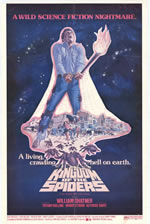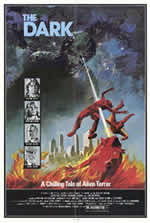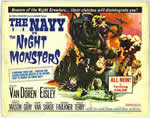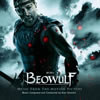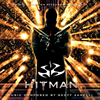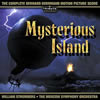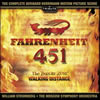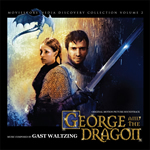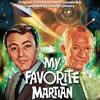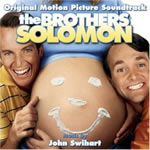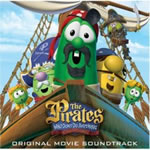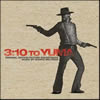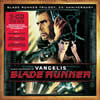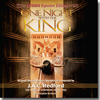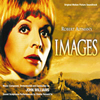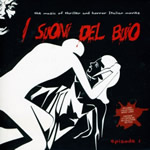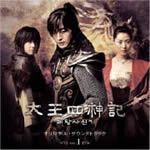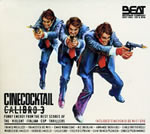SOUNDTRACK GENRES |
| SHEET MUSIC |
| LPS AND CASSETTES |
| BARGAIN BIN |
| RARE AND ONE OF A KIND |
| AUTOGRAPHED CDs |
| NON-SOUNDTRACK CDS |
| RELATED LINKS |
| CONTACT US |
Past Columns
8/1/07
8/14/07
8/26/07
9/10/07
9/24/07
10/8/07
10/22/07
11/5/07
11/19/07
12/03/07
Randall D. Larson's SOUNDTRAX
|
Soundtrax: Kingdom of the Library Tracks
December 17th, 2007By Randall D. Larson
This week we talk with composer, music supervisor, and producer Igo Kantor, whose recollections of putting together B-movie film scores during the 1950s and 1960s illuminate the little-known production techniques commonly found on these low-budget features. We also review the soundtracks to Beowulf, Hitman, George and the Dragon, The Water Horse, My Favorite Martian, Atonement, The Brothers Solomon, The Pirates Who Don’t Do Anything: A VeggieTales Movie, and we take a close listen to the inaugural CD Releases from Tribute Film Classics, Mysterious Island and Fahrenheit 451. Plus news culled from the four corners of the earth, filmusicwise.
A Conversation with Igo Kantor
Producer, music supervisor, editor, and composer Igo Kantor has had a hand in most areas of motion picture and television post-production since the 1950s. Born in Vienna, Austria, Kantor received a High School and Music education in Lisbon, Portugal. He has been a US Citizen since 1952. Between 1954 and 1962, he was head of the Music Editorial Department at Columbia Pictures and Screen Gems, where he edited or supervised the music for features and TV shows. In 1963, Kantor became Music Supervisor at Universal, working on such TV shows as Wagon Train, General Electric Playhouse Theatre, and Chrysler Playhouse. In the late 1960s, as founder, president, film and music editor, and post-production supervisor at Synchrofilm, Inc. for 8 years, Kantor was in charge of post-production on about 200 features and many TV shows, specials and series, including working on Easy Rider, Five Easy Pieces, Papillon, Hang ‘Em High, Fritz the Cat, and others. He received Emmy nominations 3 years in a row for editing the Bob Hope Christmas Show. Since the late 1970s, he has concentrated on producing, acting as producer or executive producer on such films as Kingdom of the Spiders, The Dark, Mutant, Act of Piracy, Legends of the West, and the currently-in-production drama, In The Shadow of Wings.
In the music department at Columbia and Universal, Kantor worked on many B-movies as composer or music editor, where he became adept at fashioning scores out of music library tracks. He also composed music for Russ Meyer films such as Vixen, Cherry Harry & Raquel, Good Morning and Goodbye, and Faster Pussycat! Kill! Kill! I briefly spoke to Igo Kantor recently while researching for a couple of writing assignments. His recollections of creating the scores for B-movies and television illuminate techniques commonly found on these low-budget productions.
Q: How would you contrast the music of what was going on in films of the 50s with what we have today?Igo Kantor: What we have today, unfortunately, is a lack of thematic content. Today, music becomes much more a matter of musical effects as opposed to thematic material. There are very few pictures that have themes; it’s mostly musical backgrounds and scores that are just doing pretty much the same thing as sound effects. The credo today is: “Music should not be more important than the film. It should be a complement, and therefore let’s not to themes that detract from the story, because people start listening to themes.” That shouldn’t be the case, but it is the case today, where you have very important musical effects that will enhance the dramatic punctuations of the film, but you very seldom hear themes anymore. I come from an era where themes were very important, where the theme of a picture identifies the picture itself, but today it’s very rare to get that. You sometimes you get a picture out of England or France, which has a beautiful theme, but here it’s not too often. John Williams of course is an exception; he still has themes in a movie.
Q: As a composer, you’ve done some films yourself such as several movies for Russ Meyer and some other scores. What was your approach to writing film scores in films like these?
Igo Kantor: I was raised in Lisbon, Portugal and I studied music at the Conservatory of Lisbon when I was young. I studied composition and orchestration and so forth, so my approach comes back to those days. I was always a lover of old time composers, going back to the days of Steiner, Victor Young, Waxman and so forth. I always saw myself doing the same kinds of things they were doing, but I didn’t have the opportunity, I got into film editing and all kinds of work that didn’t give me much chance to really write. I love music. Right now, for instance, we’re preparing a film shot in South Africa (In The Shadow Of Wings), where we definitely going to have a theme similar to what they had in Out Of Africa. The story lends itself to that kind of a theme. The film opens February 18th in Johannesburg. It’s the true story of a lady plastic surgeon out of Boston who went to visit Kenya with her husband and two kids back in the 80s; their plane got shot down over Kenya, and everybody died except her. She was in a coma for a long time in a Nairobi hospital, and she came out of it, and she found out that everybody had been buried but her daughter, so she stayed in Africa looking for her daughter, knowing in her mind and in her heart that her daughter was still alive. She founded the Flying Doctors organization and became one of their most famous surgeons, helping all the people, and ultimately she does find her daughter.
Q: Who is going the music?
Igo Kantor: We’re thinking of various composers… I may be having the composer who won the Academy Award for the picture… I’m trying to think of the name of the film, he’s a French-Moroccon composer, very well schooled composer and he likes themes like John Barry. I need a very strong theme and a very strong song to be sung by a black singer.
Q: Would that be Gabriel Yared?
Igo Kantor: Gabriel Yared – yes, he’s the one!
Q: He’d be great on that, he’s an excellent composer.
Igo Kantor: I’ve already talked to him and he’s very much interested. The lady who may wind up playing the lead in this is either Ashley Judd or Diane Lane. They’re both interested. Josh Brolin, who is married to Diane Lane, he may be the co-lead in it, and then we have William Macy and we have Liam Niesom, so we have some wonderful actors in it.
Q: Moving back to the 60s and some of the scores you wrote yourself, I’m fond for a little score you did for a film called Nightmare In Wax. What do you recall about composing this little horror score?
Igo Kantor: It was a combination of me composing and using some tracks out of a music library. It was not all composing. I mean, even in the days when I was doing all kinds of Russ Meyer things, I would write some new stuff and then I’d bring Bill Loose in, and he used to write some of the stuff, and so forth. So that score was a combination of track music and stuff that I wrote. It just a normal requirements of the film. In Kingdom Of The Spiders, for instance, I was music supervisor. I didn’t write anything. It was all music from Jerry Goldsmith, themes that he wrote over the years, which were perfect for the film.
Q: You used a lot of his Twilight Zone music in that film.
Igo Kantor: Exactly. That was some very good stuff and it just happened to fit. When I was at Columbia Pictures, my job was to track music for films, so when somebody did a feature, I used to take music from the library and track it. I was always trying to theme everything so it looked like it really belonged to the film. And then they’d have previews of the tracked music, and they used to say to the composer, “I want you to do something just like that,” which the composer didn’t like, of course. The composer doesn’t like to be told what music to write, but anyhow, that was my job, to track. I was pretty good at it. I would do some themes [I would use music from] George Duning and people like that.
Q: You’ve obviously got to have a huge musical memory when you’re trying to put together a score like that…
Igo Kantor: I cataloged everything. I cataloged the whole library, at Columbia, including all the old scores from Max Steiner and so forth, so I knew exactly what was there. If somebody gave me a picture, I’d say, “Okay I can use the thematic material from that particular picture, which fits this particular picture.” I did a picture called The Interns (1962) where I used George Duning’s music from a picture called Jeanne Eagels (1957) and then they hired this composer, Leith Stevens, and they took him to the preview and they said, ‘Oh this score fits so perfectly, we want you to do something just like that,’ and he would never talk to me again! I can write a book about experiences I’ve had over the years with composers! Dimitri Tiomkin wrote music on John Ford’s The Horse Soldiers that was not appropriate, and I took it out, and then Dimi would never talk to me again. He got mad at me and he was going to sue Batjac, the John Wayne company, for not using some of his music. He had written music for a march sequence in the 1860s, where he wrote Russian player piano music! I took it out and I put in Stephen Foster, and when he heard Stephen Foster, and he went crazy! “Who replaced it?” I said, “I did.” “Why?” he said. “Because it didn’t fit!” My God, he went crazy, he went bananas. The way they finally got rid of the lawsuit was that they gave him The Alamo to score, so that was that. And he did a very nice job on The Alamo.
Q: I’m especially interested in your work on horror films, where you were music supervisor on The Navy vs. the Night Monsters and Kingdom of the Spiders, and producer on The Dark, Mutant, and the like. What type of musical techniques do you consider useful and beneficial in those kinds of films?
Igo Kantor: Well, the staple of course is strings, and sometimes a theremin. Sometimes electronic instruments are appropriate. Anything that creates the tension, mystery, and anticipation. Building up to a crescendo, and then cutting it off suddenly can be very effective; if something’s about to happen, if you build the music to a crescendo and then you stop, and let silence, no music at all, play for a while, and then hit them hard after that. In other words, don’t have the music play constantly. These are the gimmicks you learn over the years. Music sometimes is very effective and sometimes the lack of music is very effective. Sometimes sound effects play just as important a part as music. It’s a matter of balance. And that’s something that comes from many years of watching music, and watching what works and what does not. So today, of course, it’s a different world, where so much of this percussive and electronic stuff is being used, and I must say that sometimes the electronic music today is almost as good as the acoustic but not quite. You can still tell the difference.
Q: Any final recollections of any of the scores you have worked on?
Igo Kantor: In The Dark we had a smaller score, we didn’t have the budget. The score for The Dark [composed by Roger Kellaway] was done in Los Angeles. On most of the scores I used to do I took the composers over to England or Europe to record. In fact, I took John Williams for the first time out of the country, to London. He didn’t want to go! I introduced him to the Philharmonic and the fact that they were great musicians, and he fell in love with them and he went there every time. I took a lot of composers, Dominic Frontiere, Stu Phillips, Elmer Bernstein, over to England. They always resisted at the beginning, they wanted to do it here, and I said, listen, your musicianship is the same, it’s just as good, and you’re getting a free trip out of it and you can take our family or wife or girlfriend, and you’ll have a good time, and little by little I used to talk them into it. It became a financial consideration, because we were saving a lot of money doing it out of the country. We did a picture in Rome with Elmer Bernstein, and the musicians were fine, except at lunch break they used to go out drink their lunch, and after lunch they could not blow a note! It was ridiculous. The string players were fine, but the trumpet and the woodwind players, forget it! So we decided not to have any afternoon sessions from then on, we just had morning sessions! Elmer was such a great guy, he would go along with just about anything we asked. He was a terrific composer. Jerry Goldsmith was another one. I took Jerry for the first time to London, too. He did a television movie, I forgot the name. In later years he went to Hungary to score several things. He fell in love with the musicianship in Hungary.
Q: You also worked as music editor on things like The Navy Versus The Night Monsters, Panic In The City…
Igo Kantor: Yeah, those pictures are all tracked from the music library. Those were all completely tracked. In the independent library that Gordon Zahler had, we used to have all the music from the old days, from the early Universal days, where the original composers used to do the original Frankenstein films. We used to have all those scores, so we could use that and those were really effective.
Q: What a wealth of marvelous music. What’s the challenge when you’re composing a score from library tracks, especially when you’re trying to build a thematic unity?
Igo Kantor: If you know the library, it’s not so much a challenge. To me, it’s a matter of deciding which one to use, which particular film, which particular composer to use. I’m trying to think, there was a composer who used to be famous at Universal…
Q: Hans Salter and Herman Stein were two of their major composers…
Igo Kantor: Hans Salter’s one of them, yes. Frank Skinner then later on, too. Very, very interesting stuff they had. So we used a lot of Hans Salter’s music in those early independent pictures. We didn’t have time to score, of course. From the time they gave me the picture until we mixed it was like two or three weeks. That’s all the time we had. We looked at it and decided what to do and then did it! That was all.
This Week’s Recommendations
Alan Silvestri’s score for Beowulf opens with lavish angst – low end orchestral chords and low chanting choir. Released on CD by Warner Bros on Nov 20th, the score is very reminiscent of the style and scope of Howard Shore’s music for The Lord of the Rings, and one suspects that is probably the filmmaker’s intention and Silvestri’s cross to bear. But the score is very good and very interesting in its sonic vastness and thematic depth. Primarily orchestral embellished by a large choral section, Silvestri’s Beowulf music is suitably earthy. One can taste the sloshed mud, flecked with bits of grass and grain, as it is flailed about by Silvestri’s energetic orchestrations. A stalwart theme for the title character captures the mythological legendry of the Beowulf tale and personage; Silvestri builds on this to craft a powerful motif for French horns that is both savage and eloquent. Interestingly, the score opens with a pulse of electronic bass, almost as if BT had produced the soundtrack; but this recurring synth beat provides only the cadence for an acoustic-rich, chorale-heavy opening composition, as male chorus chants severely over a rhythm of orchestra and electronics; a women’s choir answers the male, and both story and score are off and running. “First Grendel Attack,” wherein we first meet the demon Grendel, against whom the epic clash forges the legendary tale, is half aggressive action and half reflective soliloquy, and these two elements capture the essence of Silvestri’s scoring approach: a massive, orchestral assault driven by the composer’s compelling and memorable heroic main theme, and quiet moments of poignant introspection for hushed orchestra and female choir. Added to this is the folk element of both severely-chanted male chorus and a pair of folk tunes heard on the soundtrack (sung by Tony Award winner Idina Menzel; with actress Robin Wright Penn reprising the main tune, “A Hero Comes Home,” in contemporary pop style for the End Credits). The main Beowulf Theme resonated especially well in “I’m Here To Kill Your Monster,” where Silvestri opens it up into an articulate rendering for the character and its associated mythology. “Second Grendel Attack” mixes the aggression of earthy combat music with the omniscient commentary of the choir to bestow, in exquisite LOTR fashion, an almost spiritual observation of the events transpiring in the fields of battle. “I Am Beowulf” restates the main theme in especially poignant fashion, culminated in a gorgeous uplifting of chorale and horn. “Beowulf Slays the Beast” proffers a rich and melodious orchestral rendition over choir and a pounding cadence of drums, resonating with triumph and victory. “The Seduction,” on the other hand, is all quiet intonations of reverberated harp, bells, flute, and hushed choir –an attractive enticement, furtive and teasing, tinged with the taste of potential betrayal. “He Was The Best of Us” rearranges the Beowulf theme for a quiet, measured, and honorable memorial for a lost hero, and “The Final Seduction” revisits the sly allure of the earlier seduction music.
Geoff Zanelli’s score for Hitman, 20th Century Fox’s big screen/big action adaptation of the hit video game franchise scored so nicely by Jesper Kyd. While Kyd wasn’t given the opportunity to take his music onto the big screen with its live action incarnation, Zanelli, one of the latest composers to emerge from the apprenticeship of Hans Zimmer’s potent scoreschool, Media Ventures, has crafted a potent rhythm-based score which has been released on CD by La-La Land Records. Opening with a chorale rendition of “Ave Maria,” illuminating a twisted contrast between the title character’s background and his chosen profession, Zanelli takes on an environmental approach in scoring the film, which in the style of 24 and other action-based dramas (including Kyd’s original vidgame score) is derived from urban rhythms and ethnic textures (“I wanted to reflect musically the killing machine..., so tightly in sync with his environment” Zanelli informs us in the CD notes) while given a dramatic power with frequent use of sampled choir. In contrast with the percussive action tonalities, the developing relation between Hitman and Nika, the Russian femme fatale with whom he becomes enamored, is sonorous and fluent (listen to “Undress Me” for a taste of Zanelli’s provocative synth sensuality). In “My Number is 47,” Zanelli takes elements of the love theme and, well, redresses them into a somber sonority that takes on the rhythm of the title music, signifying that the character’s link with his environment includes his association with the hypnotic beauty, Nika. “Trust Unto God (Undre’s Funeral”) carries this duality further by harmonizing elements of the romantic melody with the strident, staccato rhythms of the title motif. “Righteous Buttkicking” rejoins severe intonations of male chorus (resounding across the soundscape like pronouncements of derision from the heavens) with the main theme and the love theme along with burbles of intricate and unique sonic textures, to elevate the film’s climactic fight into something of near cosmic import. “Denouement” recapitulates these elements into a heroic closing wrap-up. A classical interpretation of “Ave Maria,” sung by pop soprano Christina England, closes the CD as a bonus track.
The first pair of gorgeously restored vintage soundtracks from the aptly-named Tribute Film Classics label has arrived, and are both must-have releases. While the titles have been available in the past, they have not been made available in such complete and sonically rich performances. Restored to their full glory by producers John Morgan, Anna Bonn, and William Stromberg, with full-blooded performances by the Moscow Symphony under Stromberg’s articulate baton and a thorough set of excellent liner notes, Bernard Herrmann’s complete score for the classic Jules Verne/Schneer/Harryhausen fantasy epic, Mysterious Island, makes up the first release, with Herrmann’s music for Trauffaut’s adaptation of Bradbury, Fahrenheit 451 coupled with his Twilight Zone episode score, “Walking Distance,” making up the second. Mysterious Island has long been one of my favorite Bernard Herrmann scores. It’s a simple score, built around a 2-note chord progression that the composer long favored and which makes an appearance in many of Herrmann’s fantasy scores. The first dozen tracks capture the furious flavor of the storm, which permits a band of Civil War prisoners to escape a Northern prison on a stolen balloon, and which storm also throws them wildly off course onto the shores of the titular atoll, upon which giant animals are discovered, each of which, as it appears, in turn, through the magic of Ray Harryhausen’s special effects, are accompanied with their own unique musical accompaniment, lending the score an array of fine moments, while its primary chordal motif captures the overall essence of the island and of the character’s predicament. That motif is given dozens of variations in both large and small scale; Mysterious Island is a brilliant example of theme-and-variation in Herrmann’s finest form; its evocative sense of bewilderment and wonder is captures splendidly in the music, which brings to life every crevasse of the cave in which the characters take refuge, and in each blinking eye of giant crab, giant bird, giant bee, and giant octopus that serves to threaten that sanctuary. “Underwater” is a magnificent capturing of Herrmann’s motific ambiance, a clever and captivating chord progression that weaves along with the moving depths and plodding footfalls of the aquamen. The celebrated music for the giant bird attack, famously derived from a fugue by Johann Ludwig Krebs, resembles both the awkward, almost comical avian attacker, while providing for its ungainly attack a kind of classical elegance, a brilliant scherzo for tearing talons and biting beak. In kind, the giant bee encounter is accompanied with a buzzing flurry of motifs freely adapted from Rimsky-Korsakov, beaten down to a slower tempo and register that reflects the oversized hymenopterid. While the enormous animals are given musical accompaniment unrelated to recurring motifs, the human cast is represented by repeating themes and motifs, from the slowly-awakening love themes that develop between a couple of couples to the overarching main theme as it comes to represent the cast as much as it does the island itself. It’s a pervasive score, both thunderous and intricate, a fascinating example of imaginative orchestration and constantly renewed musical textures, melodic and measured, brilliantly conceived and eloquently carried out by the composer and by Morgan & Co. on this disc.
Fahrenheit 451 is a wondrous composition, opening for a rich texture of harp, bells, and sinewy strings in an effective ambiance of enchantment and mysterioso. Herrmann’s Main Theme, “Fire Station,” is a fast-paced romp for strings enhanced by xylophone, lending urgency and an import to the main character’s mission (rather than to put out fires, to burn forbidden books). This motif is contrasted against – and often set into – a suspenseful variation introduced in “The Lamp,” dangerous strings, insistent harp glissandi, and a gently swaying violin love theme for “Clarisse,” the secret reader for whom the film’s protagonist gains an affection. The score not only supports the visual activities of the characters but does a terrific job on supporting the film’s – and Bradbury’s – subtexts about freedom and anti-totalitarianism and the power of the written word. Rather than giving Truffaut the “music of the 21st Century” that the asked for, Herrmann instead fashioned a splendid approach of “future-retrograde;” Truffaut’s rather bleak look at the future is rendered colorful and expressive by way of Herrmann’s melodic and rhythmic score, which gives the film a timeless sensibility rather than locking it into a kind of dated 60’s interpretation of the future. The music is splendidly Herrmannesque, empowered with the melodic, and rhythmic, and emotive persuasion that the composer excelled at more than anyone else who has ever dabbled in film scoring. It’s a somewhat more subtle score than the mighty measures of Mysterious Island, but it’s just as powerful in its musical encapsulation of oppression and the contrasting freedom of choice (represented by the harp, bells, and strings that bookend the score proper).
“Walking Distance,” originally composed for a small string ensemble, is arranged here for larger group, giving it a fuller sound than that heard in previous recordings of the score (the Herrmann Twilight Zone collection, conducted by Joel McNeely, on Varese Sarabande; or the original soundtrack suite included on the same label’s 1983 LP, The Twilight Zone, Vol. 1). The score is a melancholic tone poem for memory, wistful and forlorn, aching to recapture pleasures of one’s past while evocative in the tendrils of irony that allow Martin Sloan to recapture a lost era of his past in the episode. The music is spare, melodically, but expressive in feeling.
The presentation on both CDs includes many segments cut in whole or in part from the film soundtracks. With a minimal gap between CD tracks, all three scores may be enjoyed in the manner of a concert performance that belies the shortness of individual tracks. At 71:27 and 77:40 playing time, respectively, there is a lot of music here, beautifully restored to a pervasive sonic splendor. Herrmann has rarely sounded better, and Stromberg and company have done the composer – and their new label – well with these inaugural releases.
MovieScore Media’s release of Gast Waltzing’s sumptuous score for George And the Dragon is a pleasing fantasy adventure score that fits right into the mold of this month’s big fantasy releases like Beowulf, The Water Horse, and The Golden Compass, even though the film is a 2004 release (in the US, it played on the Sci-Fi channel under the title Dragon Sword). The film is a comedic fantasy (described by reviewer as a cross between Dragonslayer and Monty Python And The Holy Grail), but Waltzing plays it straight and proffers a pleasing orchestral score characterized by sweeping melodies and accessible melodies. While it’s not as immediately accessible a score as some of the others mentioned above, Waltzing, a Luxembourg-born composer who has scored films and TV in France and Germany since 1989, is a capable melodist who has composed an effective enough large orchestral score. The music is performed by the Luxemburg Philharmonic Orchestra and the choir A. Piacere & Les Amis du Chant. “Dragon Horn” exhibits Waltzing’s main theme very nicely, and introduces a rendition of the motif by solo female voice. The singer’s voice, while slightly plaintive, resounds nicely enough through this track and a couple others, lending both an elegance and a slightly archaic tonality to these cues. “Battle of the Pics” is a nice action piece, suitably energetic. ”George and the King” is an exquisite track for recorder over an engaging melodic undercurrent of strings, embellished by the {unidentified] singer. Choir intones nicely in “Hunt Cabillo,” giving the cue a nice flowing energy. “Rescue Princess” features a rhythmic propulsive aggression that prompts the titular rescue; “Last Battle” and “Battle and Birth” are both splendid and solid battle musics, vividly energetic and driving, the latter concluding provocatively with a poignant soliloquy from bells and hushed choir. The score proffers pleasant orchestration and a satisfying folksy quality in its melody and delivery; the cue “George and the Dragon” culminates with a powerful intonation of orchestra and sublime melody; then morphs into the exhilarating romp of “Last Ride,” which soon makes way for a final reprise of a strong and vibrant “Love” theme. The album closes with a dull song nicely sung all the same by Maggie Parke.
http://www.moviescoremedia.com/georgeandthedragon.html
James Newton Howard’s score for The Water Horse: Legend of the Deep, the season’s hokiest looking family fantasy, has been released on Sony Classical and is a predictable but very likable score. Comprising expressive melodies, threatening but not truly endangering mysteriosos, and a lovely, heroic, family-film main theme which is given several opportunities to dazzle and soar. Although the film takes place in Scotland, Howard gives the film an Irish ethnic sensibility through his melody and scope, which is a kind of grand, Celtic symphony, the score’s use of tin whistle, Irish harps, cor Anglais, and Irish fiddle, singer Sinéad O’Connor, and the Irish folk band, the Chieftains. Despite the presumably intentional geographic/ethnic faux pas, the music retains the right tonality, texture, and sound to fit the essence of the story. “Swimming” opens up into a majestic and beautiful rendition of the main theme; “Saving Crusoe” and the end of “The Net” really give the main theme a showcase; the latter culminates in a provocative French horn melody line that is quite captivating. “The Dinner Party” is a riot – a seriocomic cartoon scherzo that accompanies the kind of comical disaster the title might suggest. Howard adopts a Carl Stalling approach and really throws everything into this wonderful cue. “The Fishermen” brings Howard squarely into Lord of the Dance territory with a fast-paced Irish dance tune punctuated by massed rhythmic toe taps giving the sequence a very funny, by reference, sound. The CD ends with an 8-minute suite performed by The Chieftains that revisits the score’s main elements through the band’s pure Irish instrumentation.
La-La Land Records has released the first-ever recording of original soundtrack music from the classic 1960s TV sci-fi sitcom, My Favorite Martian. Debuting in 1963, the show predated both Bewitched and I Dream of Jeannie, and set off TV’s long-running trend of fantasy-based sitcoms. Composed by George Greeley, an arranger, pianist, and composer for Columbia Pictures in the 1950s who sadly died in May, 2007, as this project was just starting (he was able to contribute a page of memories for the CD booklet), the music emphasizes the show’s domestic situation with only occasional science fiction trappings, the latter appearing with brief regularity each time Uncle Martin, the show’s marooned Martian who befriends a mild-mannered reporter until he can find a way to return home, demonstrates examples of his Martian powers. I had the pleasure of writing the notes for this release, delving deep into the history of the show and its use of music (aided by use of an unpublished interview with Greeley, conducted by Jon Burlingame); but my recommendation is based on the enchantment of the show’s wistful scores, which in its conventional dramatic style made the often madcap storylines more plausible while also enhancing its fantastical essence through use of the electro-theremin (a variant of the original theremin, used to great effect on this score and also in pop music, such as in The Beach Boys’ hit, “Good Vibrations”). Greeley enhanced the warm human drama that was at the heart of the series, while simultaneously never failing to capture its comedic sense of fantasy and the far-off. The CD captures the show’s celebrated main theme along with nearly two dozen cues arranged into mini-suites from 21 episodes from the show’s three seasons; they retain a great deal of sonic depth despite their age and small-sized orchestras.
Dario Marianelli isn’t the first composer who has used a typewriter as an instrument of his orchestral palette, but he is the latest. That venerable piece of office equipment lends a percussive texture playing off of a violin to the opening track of his score to Atonement, a persuasive drama based on the 2002 Ian McEwan British romance, whose soundtrack has been released by Decca Records and which has just been nominated for a Golden Globe Award and a Broadcast Film Critics Association Award for best original score. The typewriter, emphasizing the film’s literary origins as well as the vocation of the film’s major protagonist, a fledgling 13-year-old writer who irrevocably changes the course of several lives when she accuses her older sister's lover of a crime he did not commit. The score also features a different kind of keyboard in its orchestration through featured piano solos performed by Jean Yves-Thibaudet, who is given equal billing with Marianelli on the CD, the score is a powerful acoustic composition. The film rejoined the Oscar-nominated composer with his director on Pride and Prejudice, and the score is a suitably classical in quality to fit the art-film style embodies by director Joe Wright. Obviously emphasizing piano, a large string section gives the score much of its flavor, as insistent strokes of violins (“Two Figures by a Fountain,” “Come Back,” etc.) drive the film’s plot while low clarinet intones somberly (“Rescue Me”) to enforce the impact of the protagonist’s actions. “The Half Killed” is a breathtakingly dramatic cue, for bold, severely modulated horns over piano and slashing strings; while a low chorus more strongly conveys the cue’s feeling of ponderous heaviness to the powerful “Elegy for Dunkirk.”
Yves-Thibaudet’s rendition of Debussy’s “Claire de Lune” concludes the CD.
Lakeshore Records recently released a pleasing soundtrack to Bob Odenkirk’s new comedy The Brothers Solomon, featuring a twangy, pop-styled Mothersbaugh-esque score by John Swihart that is effervescent in acoustic textures for guitars and voices sometimes over orchestra or strings, sometimes not. Aside from four pop songs, the album is solid with Swihart’s score, mostly broken into tiny fragments of 20, 40, 50 seconds each, but strung together it makes for a very pleasant and cheerful soundscape. The 4:03 “Sky Writing” allows the music to develop a little longer, but it’s all quite likable. It’s a very likable soundtrack and a serviceable comedy score; I was especially fond of the tightly harmonic quasi-choral vocalizations by the female folk-pop duo, The Ditty Bops, who resound lightly like a wordless angelic Greek chorus to comment on the events as they transpire, giving the acoustic guitar-based music a greater harmonic depth and texture. www.lakeshore-records.com
Decca Records has released a song and score soundtrack to the second kid-friendly VeggieTales animated feature, The Pirates Who Don’t Do Anything, which opens in theaters on January 11th. The soundtrack features performances by Christian pop artists tobyMac, Newsboys, Reliant K and Mandisa (who belts out the album’s best and least juvenile song, “The Right Thing”), as well as ten tracks of original score (mostly tracks harboring singing in one form or another; after all this is VeggieTales) by veteran VeggieTales scorer, Kurt Heinecke. There is one compelling orchestral cue without VeggieSinging, “The Sea Medley,” which is a splendid swashbuckling styled cue with adventurous trumpets, swirling strings, pounding drums, at least until that damnable cucumber barges it and starts singing. “Walking Rocks,” after a half-minute of dialog, segues into a nicely energetic orchestral track, mighty adventure and such, eventually morphing into a comedic cartoon romp. Ditto for “Donkey-Shaped Help/Final Battle” and “Spanish Gold Reprise/Celebration,” both of which emerge after some dialog or singing into a very fine swashbuckling action track. It’s all mostly juvenelia through and through, but plenty of fun for the kidcrowd.
Golden Globe Award & Others - Music Nominations
The Golden Globe nominations have been announced, including the music categories:
BEST ORIGINAL SCORE - MOTION PICTURE
MICHAEL BROOK, KAKI KING, EDDIE VEDDER - INTO THE WILD
CLINT EASTWOOD - GRACE IS GONE
ALBERTO IGLESIAS - THE KITE RUNNER
DARIO MARIANELLI - ATONEMENT
HOWARD SHORE - EASTERN PROMISESBEST ORIGINAL SONG - MOTION PICTURE
"DESPEDIDA" - LOVE IN THE TIME OF CHOLERA
Music by: Shakira, Antonio Pinto, Lyrics by: Shakira
"GRACE IS GONE" - GRACE IS GONE
Music by: Clint Eastwood, Lyrics by: Carole Bayer Sager
"GUARANTEED" - INTO THE WILD
Music & Lyrics by: Eddie Vedder
"THAT'S HOW YOU KNOW" - ENCHANTED
Music & Lyrics by: Alan Menken
"WALK HARD" - WALK HARD: THE DEWEY COX STORY
Music & Lyrics by: Marshall Crenshaw, John C. Reilly, Judd Apatow, Jake KasdanThe Broadcast Film Critics Association has also announced their award nominees, including the music categories;
BEST SONG (They nominate the performers, not the songwriters. Go figure.)
"Come So Far,” Queen Latifah, Nikki Blonsky, Zac Efron, Elijah Kelley - HAIRSPRAY
"Do You Feel Me,” Anthony Hamilton - AMERICAN GANGSTER
"Falling Slowly,” Glen Hansard and Marketa Irglova, Jesse L. Martin and Cast - Once
"Guaranteed,” Eddie Vedder - INTO THE WILD
"That's How You Know,” Amy Adams - ENCHANTEDBEST COMPOSER
Marco Beltrami - 3:10 TO YUMA
Alexandre Desplat - LUST, CAUTION
Clint Eastwood - GRACE IS GONE
Jonny Greenwood - THERE WILL BE BLOOD
Dario Marianelli - ATONEMENT
Alan Menken - ENCHANTEDThe Los Angeles Film Critics Association has given their Best Music Score award to Glen Hansard and Marketa Irglova's song score for Once, with Jonny Greenwood's score for There Will Be Blood as the runner-up. - via www.filmscoremonthly.com
The 2007 Annie Award Nominations for music have been announced by the Los Angeles chapter of The International Animated Film Society. This year’s nominations for music are:
Music in an Animated Feature Production
Olivier Bernet – Persepolis
Danny Elfman, Rufus Wainwright & Rob Thomas – Meet The Robinsons
Michael Giacchino – Ratatouille
Rupert Gregson-Williams – Bee Movie
Amy Powers, Russ DeSalvo & Jeff Danna – Disney Princess Enchanted TalesMusic in an Animated Television Production
Alf Clausen & Michael Price – The Simpsons: “Yokel Chords” (Fox)
Evan Lurie, Robert Scull & Steven Bernstein – The Backyardigans: “International Super Spy” (Nickelodeon)
Drew Neumann & Gregory Hinde – Billy & Mandy’s Big Boogey Adventure (Cartoon Network)
Shawn Patterson – El Tigre: “Yellow Pantera” (Nicklelodeon)
James L. Venable & Jennifer Kes Remington – Foster’s Home For Imaginary Friends: “The Bloo Superdude and the Magic Potato Power” (Cartoon Network)The Annie Awards will be presented on Friday, February 8, 2008.
www.annieawards.org
Music for a Restored John Ford Silent Classic
Composer Tim Curran has scored legendary director John Ford’s 1928 film Hangman’s House, part of the recently released and critically acclaimed Ford at Fox DVD box set. The epic silent film, set in Ireland, features John Wayne in his first-ever role – as an uncredited extra – as well as Oscar-winner Victor McLaglen. Curran composed over 70 minutes of music for the restored film, and his score covers a broad arc, from sweeping Irish-flavored themes and romantic melodies to playful counterpoint and modern motivic composition to help enhance the film’s dark, gothic scenes.
Curran comes from a jazz and classical background. He has composed music for four documentaries on 20th Century Fox’s Collector’s Edition DVD of the Oscar-winning film Twelve O’Clock High, and is currently involved in various commercial projects for the Walt Disney Co.
All of the silent films included in the DVD set (available both the huge 24-DVD set, in a mini-set entitled “John Ford’s Silent Epics,” and as an individual single disc) have newly recorded scores composed by Christopher Caliendo and Tim Curran.
Film Score News
Theodore Shapiro, who has scored many blockbuster comedies including The Devil Wears Prada, Blades of Glory and Dodgeball: A True Underdog Story, has been hired to score Paramount Pictures’ new Eddie Murphy comedy, Nowhereland. The film is directed by Karey Kirkpatrick, whose recent credits include directing the animated Over the Hedge and writing the script for and producing the upcoming fantasy adventure The Spiderwick Chronicles. In the film, Eddie Murphy plays a father who enters his daughter’s imaginary world. Shapiro is also doing the music for Semi-Pro (yet another sports comedy, starring Will Ferrell and Woody Harrelson) and Tropic Thunder (an action comedy directed by Ben Stiller). – via filmmusicweekly.com
“Al-Viiinnn!” Christopher Lennertz has given a new voice to Alvin and the Chipmunks with his score to 20th Century Fox’s big screen recreation of the late 50’s animated phenomenon, originally created in 1958 by Ross Bagdasarian Sr, who serves as co-producer of the new movie. Lennertz (The Comebacks, TV’s Supernatural) incorporates subtle, technical elements, such as backwards percussion and mallets that resemble acorns falling, into his robust original score, performed by a 94-piece orchestra. A trendy song soundtrack has been issued on Razor & Tie Records (with an international pressing on Phantom Sound & Vision that includes two additional song tracks); no word yet on a score CD but we’ll keep check the usual suspects (Varese, La-La Land, etc) and advise. Lennertz, meanwhile, has scored the family romance, The Perfect Holiday, which opened last week.
The Little Mermaid III Disney’s third film (and second direct-to-DVD sequel) in the little fishgirl princess series, which kicked off with the ground-breaking Alan Menken-scored theatrical feature in 1989, will get an original score by James Michael Dooley. According to the Film Music Weekly, Dooley will also do the score for Impy’s Island 2, a follow-up to the German animated 2006 feature which he also scored. His other recent scores include Daddy Day Camp and Bachelor Party 2: The Last Temptation. – via filmmusicweekly.com
David Buckley has been hired to score The Forbidden Kingdom, a martial arts action movie starring the genre’s two biggest stars, Jet Li and Jackie Chan. Buckley has been a member of Harry Gregson-Williams’ scoring team for a couple of years, doing additional music for films such as Flushed Away and Shrek the Third. Gregson-Williams will produce David’s score together with Adam Smalley, who is also the music supervisor on the picture. David Buckley has also been hired to do the music for Joel Schumacher’s new film, Town Creek. – via filmmusicweekly.com
Soundtrack News
This week, Lionsgate releases the soundtrack to 3:10 to Yuma, the Western remake starring Russell Crowe, Christian Bale and Ben Foster and directed by James Mangold. The original score, written by Marco Beltrami, echoes Mangold’s modern spin on the western genre, blending traditional elements with vibrant, contemporary sounds to create an innovative, emotionally satisfying soundtrack. Director James Mangold, whose knowledge of music greatly informed his direction of the Academy Award-winning film Walk the Line, credits Beltrami’s soundtrack for 3:10 to Yuma with “being dazzling in its technique, but even more accomplished for the emotional power it brings to the picture.” For the film, Beltrami created confident and lyrical melodies and themes, featuring everything from wheezing organ pedal to high speed guitar picking to bugle to full orchestra to fuzz guitar to mouth harp.
Tuesday also sees Polydor’s 3-CD set soundtrack to Blade Runner, Ridley Scott’s influential and archetypal 1982 science fiction film, coinciding with the imminent release of the 5-DVD set package of the movie, with its various versions and tons of extras. The music to Vangelis has also been issued in various versions over the years, but this 25th Anniversary soundtrack set provides the complete music from the film, and a lot more, for the first time: the original soundtrack recording, remastered from its premier 1994 LP release; the unreleased music that wasn’t included in that 1994 LP; and an entire album of “newly written” material composed by Vangelis for the 25th anniversary. “The music is strong and flowing, and retains the dark, atmospheric sense of the original score,” notes Polydor’s press release. “There are some intriguing spoken word contributions too, from Ridley Scott, Roman Polanski, Oliver Stone and a host of distinguished actors, personalities and world dignitaries.”
Varese Sarabande will release James Newton Howard’s music for I Am Legend, in which Will Smith plays the Last Man On Earth in this latest adaptation of the influential Richard Matheson novel, on December 15th. That day will also bring releases of Mark Isham’s The Mist, and the James Newton Howard/Pete Golub documentary score for The Great Debaters (Yet another J N Howard soundtrack comes out this week from Varese, the Mike Nichols cold war drama Charlie Wilsons’ War), along with Trevor Morris’ score for the Showtime TV drama series, The Tudors and George S. Clinton’s score for HBO’s miniseries Bury My Heart At Wounded Knee. www.varesesarabande.com
Intrada has also released a trio of new editions for the end of the year: J.A.C. Redford’s epic music for One Night With The King, a new film based on the biblical story of Esther, a Jewish girl who rises from obscurity to become the queen of ancient Persia; Alan Parker’s take on Jaws 3-D, adapting John William’s famous theme into a new score loaded with new themes; and Jerry Fielding’s winning score to The Mechanic, one of his greatest achievements, for the 1972 Michael Winner thriller about a pair of killers (played by Charles Bronson and Jan-Michael Vincent) scheming to assassinate each other as they partner against a common target. This CD marks the premiere release of the complete score, remixed and remastered from first generation master tapes. www.intrada.com
Prometheus has announced three new CDs for release. Images was the 1972 Robert Altman thriller starring Susannah York as a delusional woman. The director's old friend John Williams provided the score, one of the most unusual in his nearly 50-year feature career, balancing gorgeous, classically styled cues with avant garde sounds provided by percussionist Stomu Yamashta (who later scored Paul Mazursky's Tempest). The score had only been released as a limited edition LP for Academy consideration (which may have helped result in the film's nomination for Best Score in '72, which eventually sourced a couple of bootlegged LPs and CDs; but this release, limited to 2000 discs, is the first commercial release of the score (as the original tapes are lost, the promotional LP was used as the master source). Prometheus will also release Jerry Goldsmith, The Early Years: Vol. 1, which presents the first-ever release of music from some of Goldsmith's first TV scores, for Playhouse 90, Perry Mason, and The Line-Up, and a re-mastered version of The Philadelphia Experiment/Mother Lode, featuring the scores by Ken Wannberg.
Mediane of Italy has released several notable book-CD compilations, such as Morricone Western, Morricone Awards, and others, which collect tracks both unique and familiar and pair them up with a 60-70 page hardback book that provides color posters and data on all of the films included on the CD. They’re very interesting, attractive, and collectable releases. Mediane has begin issuing a line of book/CDs combos related to Italian directors such as Argento, Pasolini, and actors like Tomas Milian. Among their recent releases is the eclectic composer Armando Trovajoli (aka Trovaioli), which includes a CD gallery of 17-tracks of the composer’s film themes, and a thick book of posters and cast/credit information on each of the films. Titles are in several languages, including English, as is the book’s introduction. Also available is a 20-track CD/book combo called Attori A Mano Armata, which is dedicated to the “police-cinema” made in Italy from the '70; a genre which became a cult and known all over the world for its rawness, violence, and its wonderful soundtracks. The book includes hundreds of photographs, paintings from the posters, and filmographies of the main actors who popularized these films. The CD includes the most representatative music in their original versions from composers such as Bacalov, Morricone, Micalizzi, Cipriani, De Angelis, etc.
www.mediane.itThe latest downloadable soundtrack releases from MovieScore Media are now available from iTunes.
Based on the Jack Ketchum novel, The Girl Next Door is scored by Ryan Shore, the nephew of Howard Shore. Ryan’s atmospheric and ominous original score slowly and relentlessly gets under your skin, effectively evoking the emotions of the film’s characters; The Christmas Miracle of Jonathan Toomey is a holiday movie composed by UK composer Guy Farley (Cashback, Wake of Death, Land of the Blind), which showcases the composer’s Delerue-like sensibility when it comes to writing memorable themes; and a far from hackneyed composition for Hack by Scott Glasgow, whose large orchestral score for Hack is as tongue-in-cheek as the horror comedy it serves. "What this gave me as a composer was an opportunity to explore all these visually parodies with musical parodies,” Glasglow said. “If you hear similarities to your favorite film score it is intentional and appropriate for the scene.” Plus he threw in an assortment of circus music, baroque opera, Scottish bagpipes, Japanese 'Samurai' music and light orchestral 'fun' cues. Coming up in January is another trio of online and limited edition CD releases:
David James Nielsen’s orchestral music for Tales from Beyond, a Twilight Zone-inspired anthology feature; The Killing Floor, an exciting horror/thriller score with a modern edge, composed by up and coming composer Michael Wandmacher; and orchestator/conductor Nicholas Dodd second film as solo composer, a French/British adventure movie called Treasured Island, with a “huge orchestral score.”
www.moviescoremedia.comDigitmovies’ trio of new releases of Italian filmscore rarities for December include
Bruno Nicolai’s music for Gatti rossi in un labirinto di vetro(aka “Eyeball”), a Giallo directed in 1974 by prolific director Umberto Lenzi about a serial killer in Barcelona; Gianni Ferrio’s La poliziotta, the first ever release of this 1974 police thriller; and the label’s 100th volume, celebrating five years of filmscore releases with Police Box: La Mano Spietata Della Legge - L'uomo Della Strada Fa Giustizia - Il Grande Racket, a special edition containing 3 CDs with three complete scores, never released before, from three Italian Police movies composed by, respectively, Stelvio Cipriani, Bruno Nicolai, and Guido & Maurizio De Angeles.
www.digitmovies.com
Italy’s Brioche Edizioni Musicali label has released a compelling compilation of giallo/eurohorror soundtracks called I Suoni Del Buio. A single CD compilation packaged in a box that comes with a set of 14 CD-sized cards with information in Italian and English about each film (kind of am unbound, loose-leaf version of the Mediane book/CD sets noted above), the combination includes a somewhat random assortment of notable giallo scores, including the familiar (L’Anticristo by Morricone and Nicolai; Keith Emerson’s Inferno; Nicolai’s La Dama Rossa Uccide Sette Volte; Red Queen Kills 7 Times) as well as scores of more elusive vintage, such as Nicolai’s Il tuo vizio e una stanza chiusa (aka Eye of the Black Cat), Piovani’s Il Profumo Della Signora in Nero (Perfume of the Lady in Black) and Cipriani’s Un Ombra Nell’Ombra (Ring of Darkness). A second CD is said to be underway.
www.isuonidelbuio.comLakeshore Records will release this Tuesday Michael Brook’s score for Into The Wild, Sean Penn’s screen adaptation of Jon Krakauer’s bestseller. Brooks, a 22-year old guitarist and composer has scored the Kevin Spacey-directed Albino Alligator and last year’s Oscar-winning documentary An Inconvenient Truth.
Japan’s avex trax records has released the soundtrack from the Korean Epic fantasy drama Four Gods, featuring a full orchestral score by Joe Hisaishi (Howl’s Moving Castle, Spirited Away, Kikujiro). Hisaishi has composed another splendidly melodic and captivating score; he also collaborates with K-pop sensation Dong Bang Shin Ki for “A Love Song of a Thousand Years,” the ending theme to Four Gods. The avex release includes a DVD with two music videos, one with the Shin Ki’s theme song and one with Hisaishi’s main theme.
Also from Japan, Star Child has released Kenji Kawai’s music to Akai Megane (The Red Spectacles), the first live action film from anime-maestro Mamoru Oshii. This is a reissue with unreleased music and new songs.
Switzerland’s Alhambra label has released the soundtrack to Die Schatzinsel, a new German television adaptation of Treasure Island, featuring a lavish score by Karim Sebastian Elias.
From Italy’s Beat Records comes the long-awaited “sex thriller” soundtrack to La Gatta in Calore (The Cat in Heat), composed by Gianfranco Plenizio and featuring the unique silky vocals of Edda Dell`Orso. The 1972 film was directed by Nello Rossati; the soundtrack was issued on LP but not on CD until now. Plenizio’s score delves deep into the mind of the protagonist, the sexy Eva Czemerys, and it reflects her sensations and her mood. The CD Includes an 8-page booklet with the story of the film, poster, lobby cards and liner notes written by John Bender. Beat has also released the 3rd volume on its CD-DVD combo series, Cinecocktail, this volume emerging from the dusty and forgotten Beat Records archives with a compelling selection of music from the scores of the 70s Italian action cop movies, including La polizia incrimina, la legge assolve - Roma violenta - Napoli violenta - Napoli Spara - Milano rovente - A tutte le auto della polizia - The big game - Il consigliori - Il prefetto di ferro - Liberi armati e pericolosi and many never released before tracks! The set includes liner notes in English and a DVD that features a 75-min documentary about Italian cop movies, directed by Filippo de Masi [no word on region coding or subtitles in the DVD].
Randall Larson was for many years senior editor for Soundtrack Magazine, publisher of CinemaScore: The Film Music Journal, and a film music columnist for Cinefantastique magazine. A specialist on horror film music, he is the author of Musique Fantastique: A Survey of Film Music from the Fantastic Cinema and Music From the House of Hammer. He now reviews soundtracks Music from the Movies, Cemetery Dance magazine, and writes for Film Music Magazine and others.


